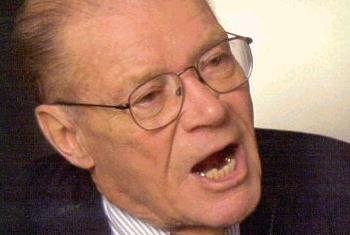Roger Ebert has said, “After twenty years of reviewing films, I haven’t found another filmmaker who intrigues me more… Errol Morris is like a magician, and as great a filmmaker as Hitchcock or Fellini.” That’s rather excessive praise, but one thing that can’t be argued is that Morris’ recent win of the Best Documentary Oscar was well deserved (at least considering that Academy voters don’t know Jean-Claude Labrecque).
Morris’ seventh feature is neither a work of biography nor a work of history, but it does communicate a lot about the life of former Secretary of Defense Robert Strange McNamara and about America’s wars against Japan in the 1940s and Vietnam in the 1960s. McNamara has long been portrayed as a fascist, a warmonger, an arrogant, egotistical, duplicitous, know-it-all “IBM machine on legs” responsible for thousands of needless deaths. “The Fog of War” lets us hear his side of story and we can see that while he’s made mistakes that killed people and destroyed nations, he always acted in good faith and isn’t the monster he’s been painted as.
McNamara first acted as Defense Secretary under Kennedy, and he was with him all through the Cuban missile crisis. Disaster was averted only because some advisor was able to step out of his American perspective and put himself in the Russians’ shoes (Lesson #1: Empathize with your enemy.). For the seven years that McNamara worked at the Pentagon, he lived the Cold war 24 hours a day and 365 days a year. Nuclear war always seemed just a blink away and, ultimately (Lesson #2: Rationality will not save us.), it’s blind luck that saved the world.
While war was central to much of McNamara’s life (he cites the 1918 victory as his earliest memory), in the 1950s he was a very successful executive at Ford, using the same skills (Lesson #4: Maximize efficiency.) to sell more cars and make them safer that he’d previously used when he served in World War II under the infamous General Curtis LeMay. Many aren’t aware that before the US dropped two atomic bombs on Hiroshima and Nagasaki, Allied planes firebombed dozens of Japanese cities, burning to death nearly a million civilians. LeMay and McNamara believed what they did was justified in regard to their military goals, but McNamara actually admits that if they’d lost the war, they would have been considered war criminals.
After Kennedy was assassinated, McNamara worked in collaboration with President Johnson as the Vietnam War escalated. The film makes extensive use of taped conversations between the two and it’s quite shocking to hear that, right from the start, they knew Nam was an impossible ball of confusion. To American officials, Nam was a continuation of the Cold War, it was about not giving up another part of the world to the Communists. But as McNamara would realize only decades later (Lesson #8: Be prepared to reexamine your reasoning.), the Vietnamese thought that the US, like France before, wanted to force their colonialism on them; they fought for their independence and could have cared less, really, about Russia and China.
The thinking of those who fight wars is that while people shouldn’t kill people, in the context of war it’s justified (Lesson #9: In order to do good, you may have to do evil.). McNamara says that he was part of a mechanism and that he did what he thought had to be done at the time. To a pacifist like me this is bullcrap, but the man seems sincere and is able to admit that he’s made mistakes. It also shouldn’t be forgotten that Johnson, not McNamara, was President at the time and he influenced greatly how things turned out in Nam. McNamara’s legacy and History would have been much different if President Kennedy had lived.
McNamara’s life and the mistakes he made aren’t just something to look at, shake your head and be thankful is in the past. War was, is and unfortunately will always be part of our lives (Lesson #11: You can’t change human nature.). War is something too primal, too complex for the human mind to comprehend, and what we don’t know or understand we can only repeat. Maybe in 30 years there will be a documentary in which current Secretary of Defense Donald Rumsfeld comes clean about the mistakes of the US during the so-called war on terror.
One of Errol Morris’ trademarks is the Interrotron, his unique system of modified Teleprompters which allows him to project his image on a monitor placed directly over the camera’s lens and have interviewees address that image, i.e. look directly at the camera and, by extent, the audience. The music of Philip Glass is integral to the film, because as Morris so aptly puts it, “No one does existential dread as well as Philip Glass. And this is a movie filled with existential dread.”
Morris also makes great use of archival footage, editing it in a way that’s both informative and stylistically dazzling, building up in combination with McNamara’s discourse (say what you will about his morals, but the man know how to tell a story) and the Glass score into something increasingly intriguing, fascinating and, yes, maybe magical as Ebert suggests.

